MIS500 Report: Disruptive Innovation in the Hospitality Sector
VerifiedAdded on 2022/07/28
|6
|1448
|26
Report
AI Summary
This report examines disruptive innovation within the hospitality sector, focusing on how businesses leverage information systems to create new value and reduce costs. The report analyzes the impact of mobile applications, QR code check-ins, and other technological advancements. It explores how companies can offer innovative services like home-like accommodations and on-demand services to attract customers. The role of information systems in managing bookings, customer support, and competition is also discussed. The study concludes that business information systems are crucial for developing successful disruptive innovations in the hospitality industry, enabling companies to adapt to market changes and maintain a competitive edge. References include various academic sources to support the findings.
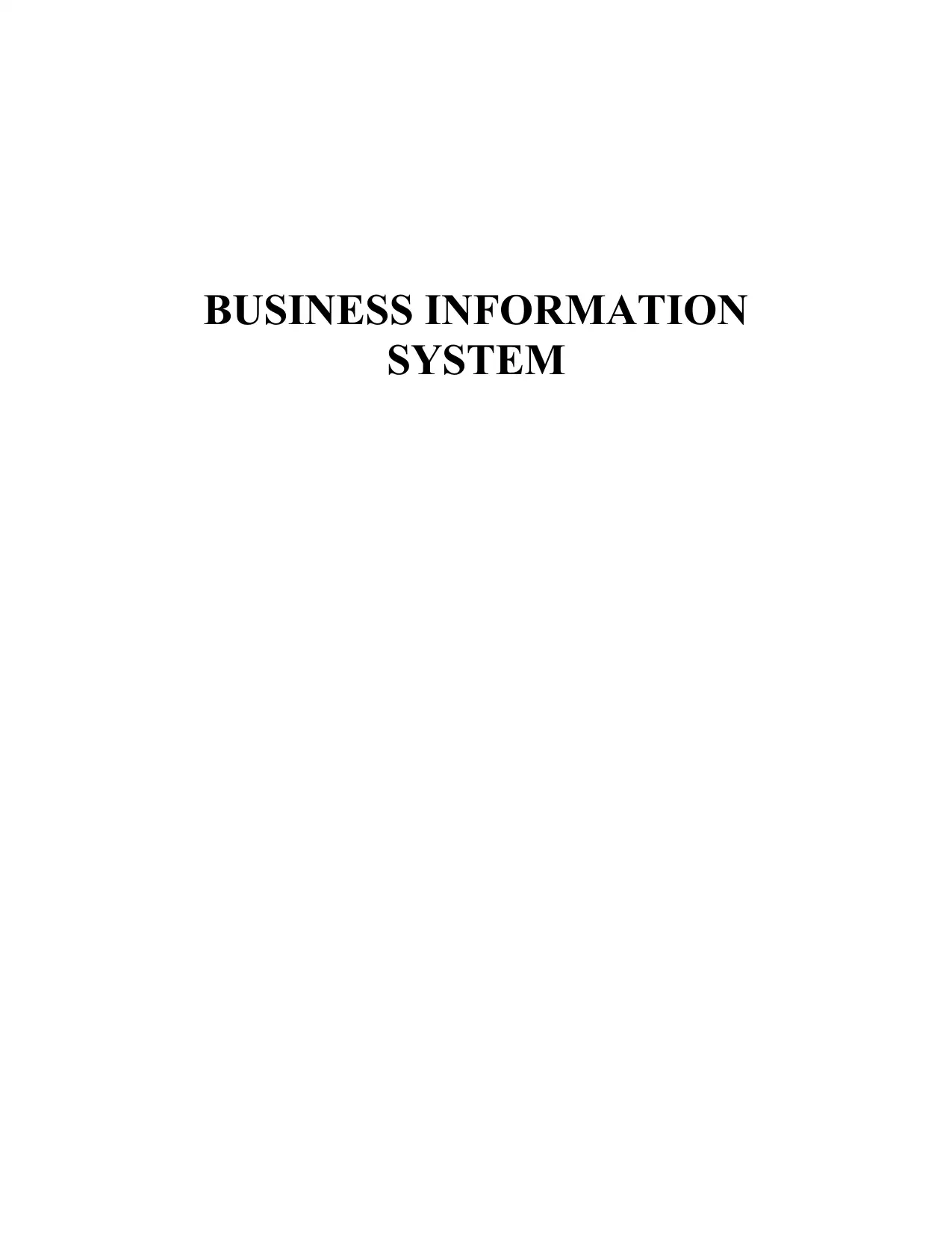
BUSINESS INFORMATION
SYSTEM
SYSTEM
Paraphrase This Document
Need a fresh take? Get an instant paraphrase of this document with our AI Paraphraser
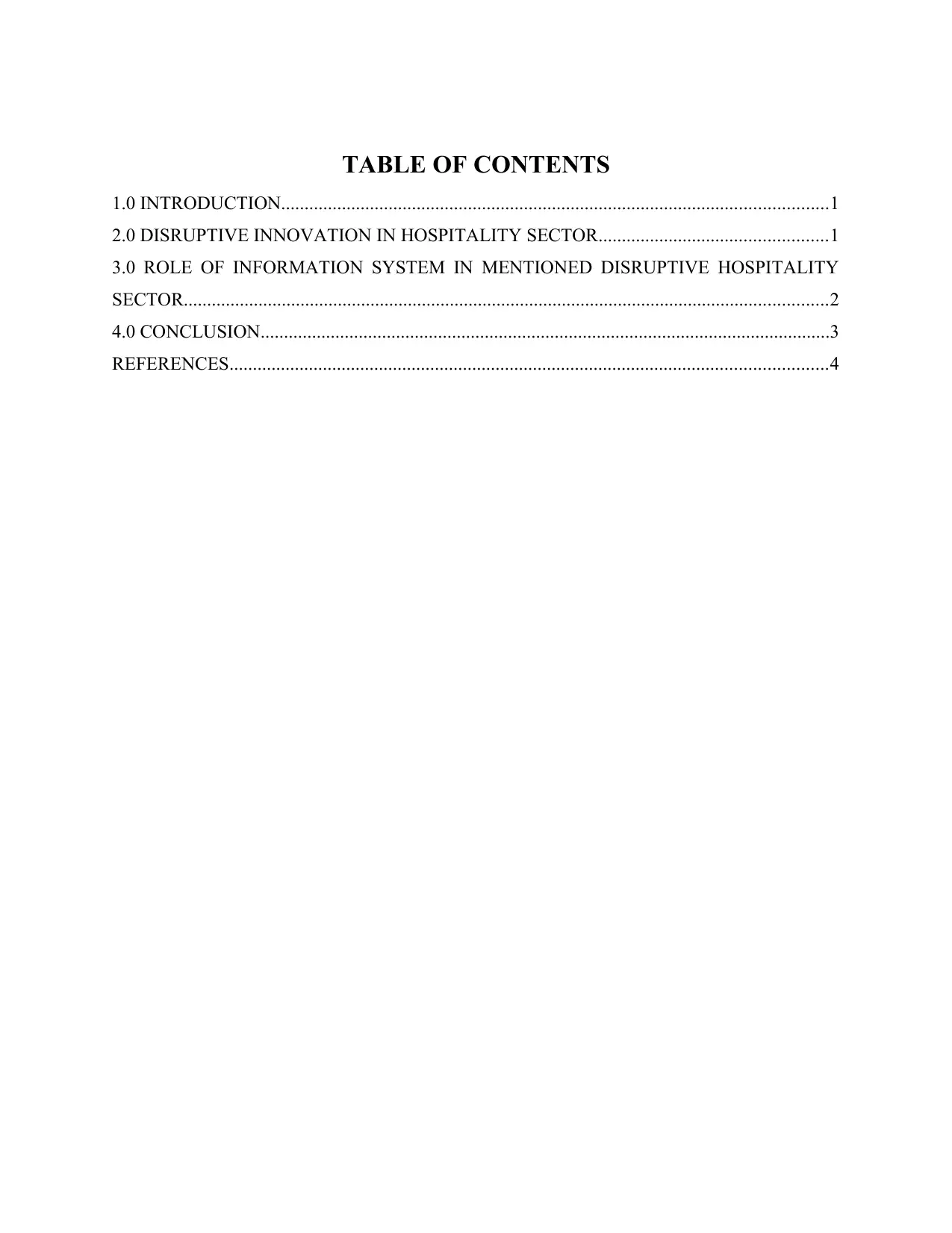
TABLE OF CONTENTS
1.0 INTRODUCTION.....................................................................................................................1
2.0 DISRUPTIVE INNOVATION IN HOSPITALITY SECTOR.................................................1
3.0 ROLE OF INFORMATION SYSTEM IN MENTIONED DISRUPTIVE HOSPITALITY
SECTOR..........................................................................................................................................2
4.0 CONCLUSION..........................................................................................................................3
REFERENCES................................................................................................................................4
1.0 INTRODUCTION.....................................................................................................................1
2.0 DISRUPTIVE INNOVATION IN HOSPITALITY SECTOR.................................................1
3.0 ROLE OF INFORMATION SYSTEM IN MENTIONED DISRUPTIVE HOSPITALITY
SECTOR..........................................................................................................................................2
4.0 CONCLUSION..........................................................................................................................3
REFERENCES................................................................................................................................4
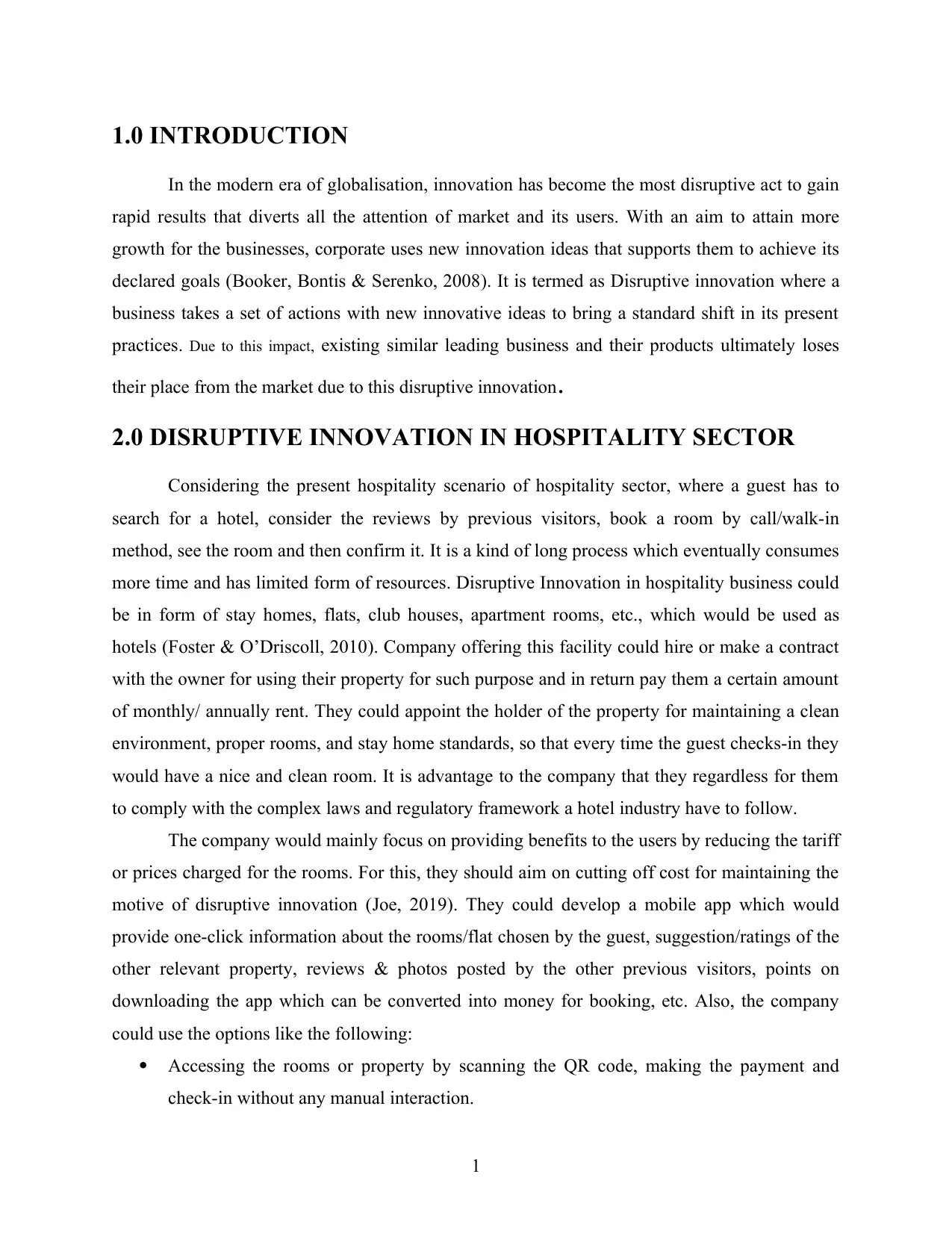
1.0 INTRODUCTION
In the modern era of globalisation, innovation has become the most disruptive act to gain
rapid results that diverts all the attention of market and its users. With an aim to attain more
growth for the businesses, corporate uses new innovation ideas that supports them to achieve its
declared goals (Booker, Bontis & Serenko, 2008). It is termed as Disruptive innovation where a
business takes a set of actions with new innovative ideas to bring a standard shift in its present
practices. Due to this impact, existing similar leading business and their products ultimately loses
their place from the market due to this disruptive innovation.
2.0 DISRUPTIVE INNOVATION IN HOSPITALITY SECTOR
Considering the present hospitality scenario of hospitality sector, where a guest has to
search for a hotel, consider the reviews by previous visitors, book a room by call/walk-in
method, see the room and then confirm it. It is a kind of long process which eventually consumes
more time and has limited form of resources. Disruptive Innovation in hospitality business could
be in form of stay homes, flats, club houses, apartment rooms, etc., which would be used as
hotels (Foster & O’Driscoll, 2010). Company offering this facility could hire or make a contract
with the owner for using their property for such purpose and in return pay them a certain amount
of monthly/ annually rent. They could appoint the holder of the property for maintaining a clean
environment, proper rooms, and stay home standards, so that every time the guest checks-in they
would have a nice and clean room. It is advantage to the company that they regardless for them
to comply with the complex laws and regulatory framework a hotel industry have to follow.
The company would mainly focus on providing benefits to the users by reducing the tariff
or prices charged for the rooms. For this, they should aim on cutting off cost for maintaining the
motive of disruptive innovation (Joe, 2019). They could develop a mobile app which would
provide one-click information about the rooms/flat chosen by the guest, suggestion/ratings of the
other relevant property, reviews & photos posted by the other previous visitors, points on
downloading the app which can be converted into money for booking, etc. Also, the company
could use the options like the following:
Accessing the rooms or property by scanning the QR code, making the payment and
check-in without any manual interaction.
1
In the modern era of globalisation, innovation has become the most disruptive act to gain
rapid results that diverts all the attention of market and its users. With an aim to attain more
growth for the businesses, corporate uses new innovation ideas that supports them to achieve its
declared goals (Booker, Bontis & Serenko, 2008). It is termed as Disruptive innovation where a
business takes a set of actions with new innovative ideas to bring a standard shift in its present
practices. Due to this impact, existing similar leading business and their products ultimately loses
their place from the market due to this disruptive innovation.
2.0 DISRUPTIVE INNOVATION IN HOSPITALITY SECTOR
Considering the present hospitality scenario of hospitality sector, where a guest has to
search for a hotel, consider the reviews by previous visitors, book a room by call/walk-in
method, see the room and then confirm it. It is a kind of long process which eventually consumes
more time and has limited form of resources. Disruptive Innovation in hospitality business could
be in form of stay homes, flats, club houses, apartment rooms, etc., which would be used as
hotels (Foster & O’Driscoll, 2010). Company offering this facility could hire or make a contract
with the owner for using their property for such purpose and in return pay them a certain amount
of monthly/ annually rent. They could appoint the holder of the property for maintaining a clean
environment, proper rooms, and stay home standards, so that every time the guest checks-in they
would have a nice and clean room. It is advantage to the company that they regardless for them
to comply with the complex laws and regulatory framework a hotel industry have to follow.
The company would mainly focus on providing benefits to the users by reducing the tariff
or prices charged for the rooms. For this, they should aim on cutting off cost for maintaining the
motive of disruptive innovation (Joe, 2019). They could develop a mobile app which would
provide one-click information about the rooms/flat chosen by the guest, suggestion/ratings of the
other relevant property, reviews & photos posted by the other previous visitors, points on
downloading the app which can be converted into money for booking, etc. Also, the company
could use the options like the following:
Accessing the rooms or property by scanning the QR code, making the payment and
check-in without any manual interaction.
1
⊘ This is a preview!⊘
Do you want full access?
Subscribe today to unlock all pages.

Trusted by 1+ million students worldwide
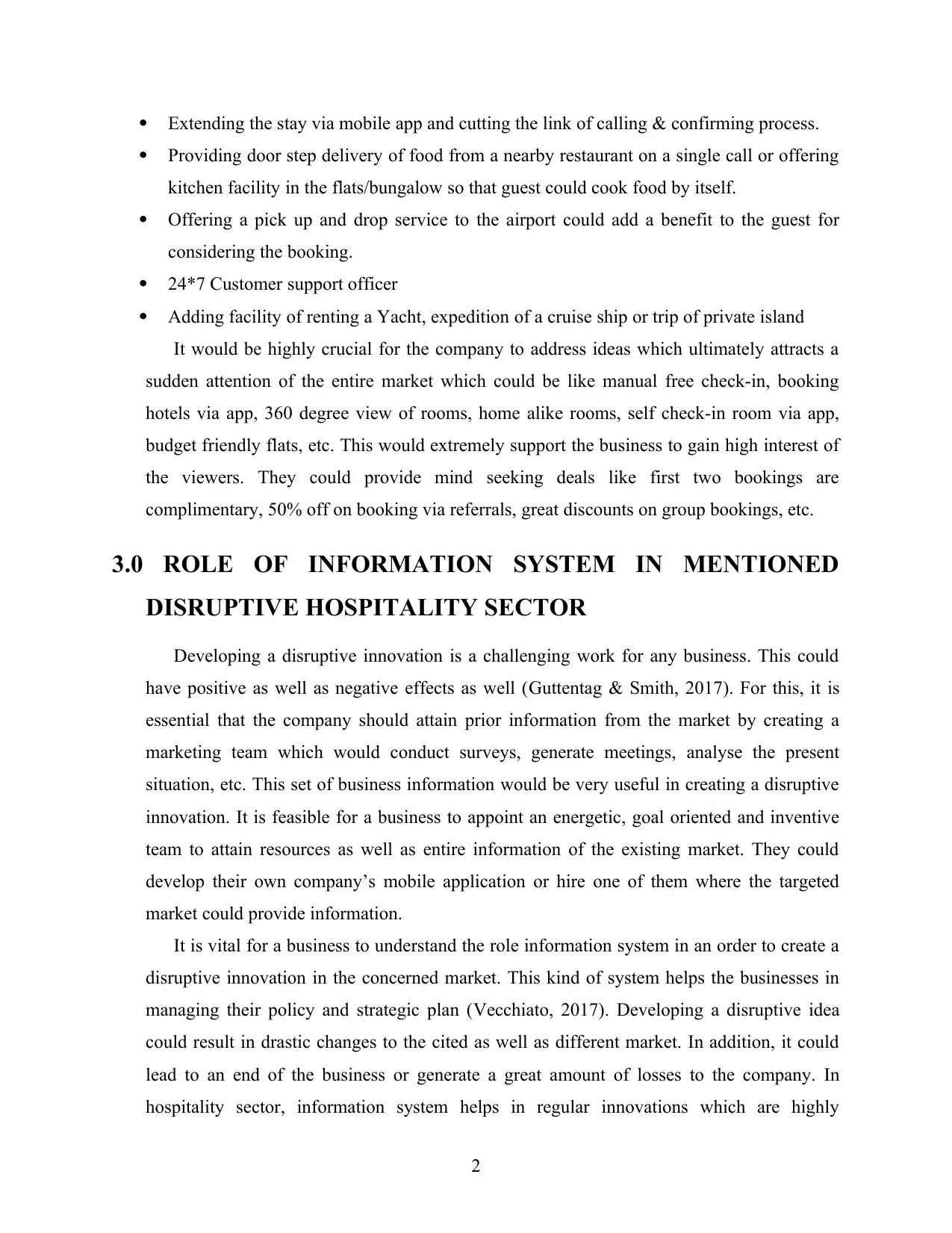
Extending the stay via mobile app and cutting the link of calling & confirming process.
Providing door step delivery of food from a nearby restaurant on a single call or offering
kitchen facility in the flats/bungalow so that guest could cook food by itself.
Offering a pick up and drop service to the airport could add a benefit to the guest for
considering the booking.
24*7 Customer support officer
Adding facility of renting a Yacht, expedition of a cruise ship or trip of private island
It would be highly crucial for the company to address ideas which ultimately attracts a
sudden attention of the entire market which could be like manual free check-in, booking
hotels via app, 360 degree view of rooms, home alike rooms, self check-in room via app,
budget friendly flats, etc. This would extremely support the business to gain high interest of
the viewers. They could provide mind seeking deals like first two bookings are
complimentary, 50% off on booking via referrals, great discounts on group bookings, etc.
3.0 ROLE OF INFORMATION SYSTEM IN MENTIONED
DISRUPTIVE HOSPITALITY SECTOR
Developing a disruptive innovation is a challenging work for any business. This could
have positive as well as negative effects as well (Guttentag & Smith, 2017). For this, it is
essential that the company should attain prior information from the market by creating a
marketing team which would conduct surveys, generate meetings, analyse the present
situation, etc. This set of business information would be very useful in creating a disruptive
innovation. It is feasible for a business to appoint an energetic, goal oriented and inventive
team to attain resources as well as entire information of the existing market. They could
develop their own company’s mobile application or hire one of them where the targeted
market could provide information.
It is vital for a business to understand the role information system in an order to create a
disruptive innovation in the concerned market. This kind of system helps the businesses in
managing their policy and strategic plan (Vecchiato, 2017). Developing a disruptive idea
could result in drastic changes to the cited as well as different market. In addition, it could
lead to an end of the business or generate a great amount of losses to the company. In
hospitality sector, information system helps in regular innovations which are highly
2
Providing door step delivery of food from a nearby restaurant on a single call or offering
kitchen facility in the flats/bungalow so that guest could cook food by itself.
Offering a pick up and drop service to the airport could add a benefit to the guest for
considering the booking.
24*7 Customer support officer
Adding facility of renting a Yacht, expedition of a cruise ship or trip of private island
It would be highly crucial for the company to address ideas which ultimately attracts a
sudden attention of the entire market which could be like manual free check-in, booking
hotels via app, 360 degree view of rooms, home alike rooms, self check-in room via app,
budget friendly flats, etc. This would extremely support the business to gain high interest of
the viewers. They could provide mind seeking deals like first two bookings are
complimentary, 50% off on booking via referrals, great discounts on group bookings, etc.
3.0 ROLE OF INFORMATION SYSTEM IN MENTIONED
DISRUPTIVE HOSPITALITY SECTOR
Developing a disruptive innovation is a challenging work for any business. This could
have positive as well as negative effects as well (Guttentag & Smith, 2017). For this, it is
essential that the company should attain prior information from the market by creating a
marketing team which would conduct surveys, generate meetings, analyse the present
situation, etc. This set of business information would be very useful in creating a disruptive
innovation. It is feasible for a business to appoint an energetic, goal oriented and inventive
team to attain resources as well as entire information of the existing market. They could
develop their own company’s mobile application or hire one of them where the targeted
market could provide information.
It is vital for a business to understand the role information system in an order to create a
disruptive innovation in the concerned market. This kind of system helps the businesses in
managing their policy and strategic plan (Vecchiato, 2017). Developing a disruptive idea
could result in drastic changes to the cited as well as different market. In addition, it could
lead to an end of the business or generate a great amount of losses to the company. In
hospitality sector, information system helps in regular innovations which are highly
2
Paraphrase This Document
Need a fresh take? Get an instant paraphrase of this document with our AI Paraphraser
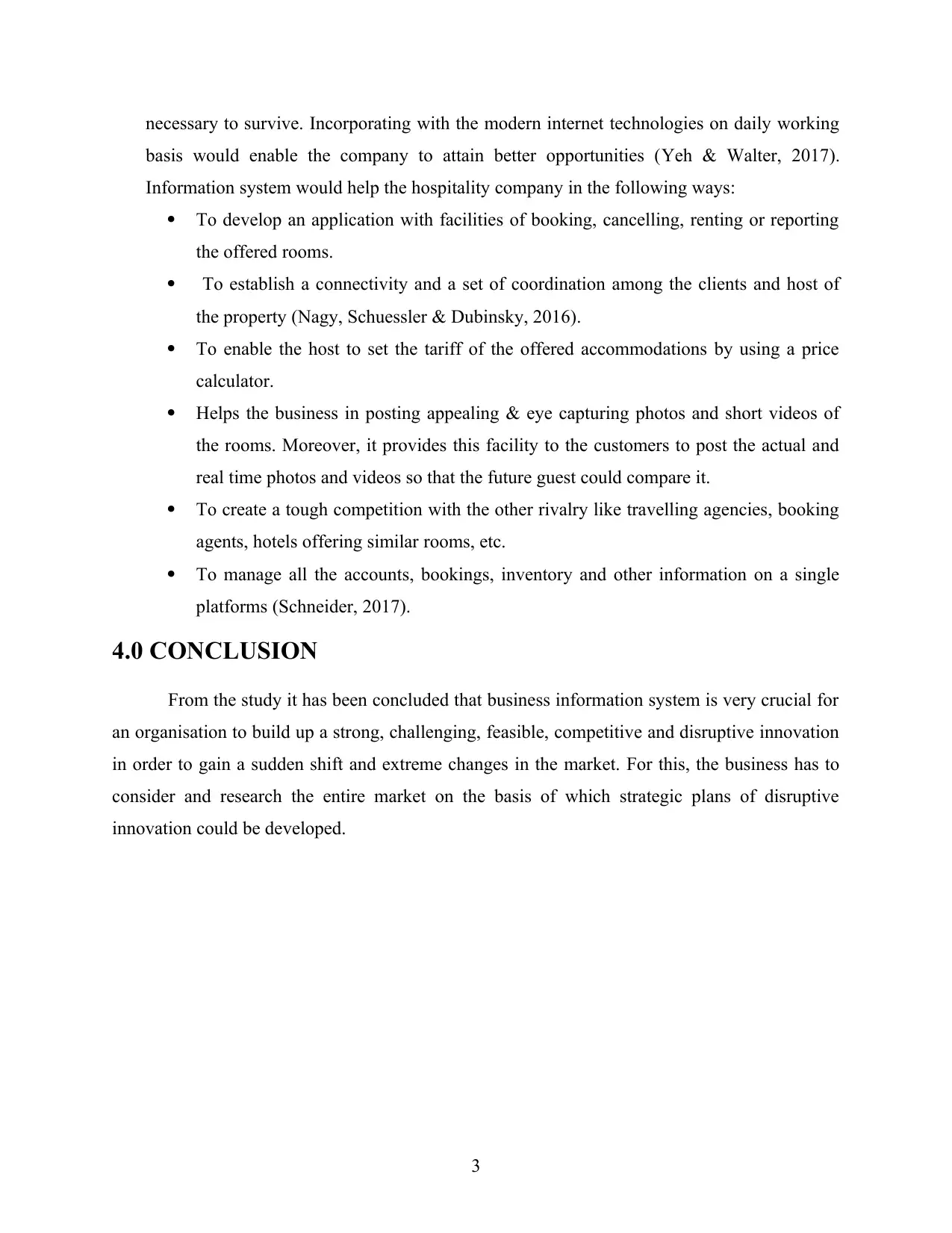
necessary to survive. Incorporating with the modern internet technologies on daily working
basis would enable the company to attain better opportunities (Yeh & Walter, 2017).
Information system would help the hospitality company in the following ways:
To develop an application with facilities of booking, cancelling, renting or reporting
the offered rooms.
To establish a connectivity and a set of coordination among the clients and host of
the property (Nagy, Schuessler & Dubinsky, 2016).
To enable the host to set the tariff of the offered accommodations by using a price
calculator.
Helps the business in posting appealing & eye capturing photos and short videos of
the rooms. Moreover, it provides this facility to the customers to post the actual and
real time photos and videos so that the future guest could compare it.
To create a tough competition with the other rivalry like travelling agencies, booking
agents, hotels offering similar rooms, etc.
To manage all the accounts, bookings, inventory and other information on a single
platforms (Schneider, 2017).
4.0 CONCLUSION
From the study it has been concluded that business information system is very crucial for
an organisation to build up a strong, challenging, feasible, competitive and disruptive innovation
in order to gain a sudden shift and extreme changes in the market. For this, the business has to
consider and research the entire market on the basis of which strategic plans of disruptive
innovation could be developed.
3
basis would enable the company to attain better opportunities (Yeh & Walter, 2017).
Information system would help the hospitality company in the following ways:
To develop an application with facilities of booking, cancelling, renting or reporting
the offered rooms.
To establish a connectivity and a set of coordination among the clients and host of
the property (Nagy, Schuessler & Dubinsky, 2016).
To enable the host to set the tariff of the offered accommodations by using a price
calculator.
Helps the business in posting appealing & eye capturing photos and short videos of
the rooms. Moreover, it provides this facility to the customers to post the actual and
real time photos and videos so that the future guest could compare it.
To create a tough competition with the other rivalry like travelling agencies, booking
agents, hotels offering similar rooms, etc.
To manage all the accounts, bookings, inventory and other information on a single
platforms (Schneider, 2017).
4.0 CONCLUSION
From the study it has been concluded that business information system is very crucial for
an organisation to build up a strong, challenging, feasible, competitive and disruptive innovation
in order to gain a sudden shift and extreme changes in the market. For this, the business has to
consider and research the entire market on the basis of which strategic plans of disruptive
innovation could be developed.
3
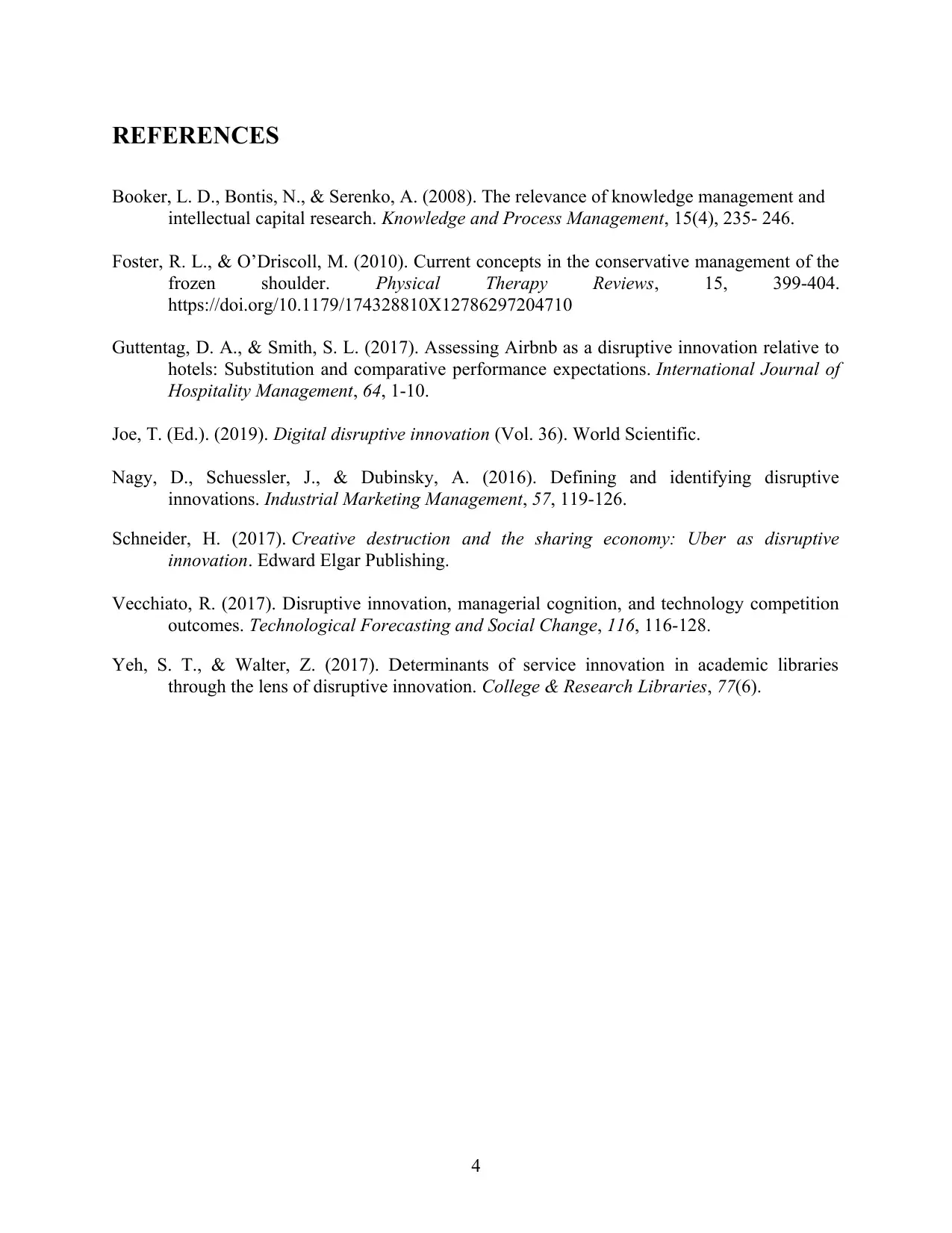
REFERENCES
Booker, L. D., Bontis, N., & Serenko, A. (2008). The relevance of knowledge management and
intellectual capital research. Knowledge and Process Management, 15(4), 235- 246.
Foster, R. L., & O’Driscoll, M. (2010). Current concepts in the conservative management of the
frozen shoulder. Physical Therapy Reviews, 15, 399-404.
https://doi.org/10.1179/174328810X12786297204710
Guttentag, D. A., & Smith, S. L. (2017). Assessing Airbnb as a disruptive innovation relative to
hotels: Substitution and comparative performance expectations. International Journal of
Hospitality Management, 64, 1-10.
Joe, T. (Ed.). (2019). Digital disruptive innovation (Vol. 36). World Scientific.
Nagy, D., Schuessler, J., & Dubinsky, A. (2016). Defining and identifying disruptive
innovations. Industrial Marketing Management, 57, 119-126.
Schneider, H. (2017). Creative destruction and the sharing economy: Uber as disruptive
innovation. Edward Elgar Publishing.
Vecchiato, R. (2017). Disruptive innovation, managerial cognition, and technology competition
outcomes. Technological Forecasting and Social Change, 116, 116-128.
Yeh, S. T., & Walter, Z. (2017). Determinants of service innovation in academic libraries
through the lens of disruptive innovation. College & Research Libraries, 77(6).
4
Booker, L. D., Bontis, N., & Serenko, A. (2008). The relevance of knowledge management and
intellectual capital research. Knowledge and Process Management, 15(4), 235- 246.
Foster, R. L., & O’Driscoll, M. (2010). Current concepts in the conservative management of the
frozen shoulder. Physical Therapy Reviews, 15, 399-404.
https://doi.org/10.1179/174328810X12786297204710
Guttentag, D. A., & Smith, S. L. (2017). Assessing Airbnb as a disruptive innovation relative to
hotels: Substitution and comparative performance expectations. International Journal of
Hospitality Management, 64, 1-10.
Joe, T. (Ed.). (2019). Digital disruptive innovation (Vol. 36). World Scientific.
Nagy, D., Schuessler, J., & Dubinsky, A. (2016). Defining and identifying disruptive
innovations. Industrial Marketing Management, 57, 119-126.
Schneider, H. (2017). Creative destruction and the sharing economy: Uber as disruptive
innovation. Edward Elgar Publishing.
Vecchiato, R. (2017). Disruptive innovation, managerial cognition, and technology competition
outcomes. Technological Forecasting and Social Change, 116, 116-128.
Yeh, S. T., & Walter, Z. (2017). Determinants of service innovation in academic libraries
through the lens of disruptive innovation. College & Research Libraries, 77(6).
4
⊘ This is a preview!⊘
Do you want full access?
Subscribe today to unlock all pages.

Trusted by 1+ million students worldwide
1 out of 6
Related Documents
Your All-in-One AI-Powered Toolkit for Academic Success.
+13062052269
info@desklib.com
Available 24*7 on WhatsApp / Email
![[object Object]](/_next/static/media/star-bottom.7253800d.svg)
Unlock your academic potential
Copyright © 2020–2026 A2Z Services. All Rights Reserved. Developed and managed by ZUCOL.




